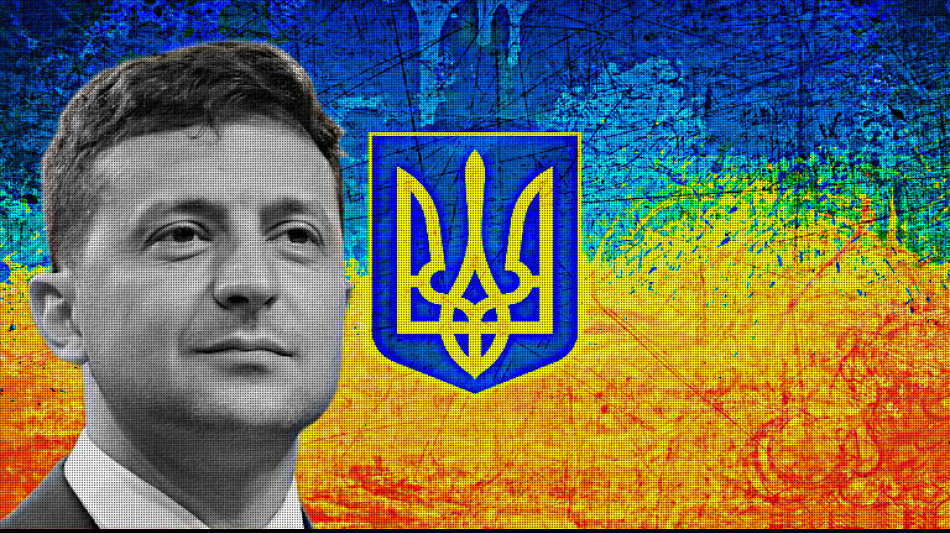-
 Less Soviet, more inspiring: Kyrgyzstan seeks new anthem
Less Soviet, more inspiring: Kyrgyzstan seeks new anthem
-
Defending champion Kyren Wilson crashes out in first round of World Snooker Championship

-
 NASA's oldest active astronaut returns to Earth on 70th birthday
NASA's oldest active astronaut returns to Earth on 70th birthday
-
Exec linked to Bangkok building collapse arrested

-
 Zelensky says Russian attacks ongoing despite Putin's Easter truce
Zelensky says Russian attacks ongoing despite Putin's Easter truce
-
Vaibhav Suryavanshi: the 14-year-old whose IPL dream came true

-
 Six drowning deaths as huge waves hit Australian coast
Six drowning deaths as huge waves hit Australian coast
-
Ukrainian soldiers' lovers kept waiting as war drags on

-
 T'Wolves dominate Lakers, Nuggets edge Clippers as NBA playoffs start
T'Wolves dominate Lakers, Nuggets edge Clippers as NBA playoffs start
-
Taxes on super rich and tech giants stall under Trump

-
 Star Wars series 'Andor' back for final season
Star Wars series 'Andor' back for final season
-
Neighbours improvise first aid for wounded in besieged Sudan city

-
 Tariffs could lift Boeing and Airbus plane prices even higher
Tariffs could lift Boeing and Airbus plane prices even higher
-
Analysts warn US could be handing chip market to China

-
 Unbeaten Miami edge Columbus in front of big MLS crowd in Cleveland
Unbeaten Miami edge Columbus in front of big MLS crowd in Cleveland
-
Social media helps fuel growing 'sex tourism' in Japan

-
 'Pandora's box': alarm bells in Indonesia over rising military role
'Pandora's box': alarm bells in Indonesia over rising military role
-
Alaalatoa hails 'hustling hard' Brumbies for rare Super Rugby clean sheet

-
 Trio share lead at tight LA Championship
Trio share lead at tight LA Championship
-
Sampdoria fighting relegation disaster as old heroes ride into town

-
 Recovering pope expected to delight crowds at Easter Sunday mass
Recovering pope expected to delight crowds at Easter Sunday mass
-
Nuggets edge Clippers in NBA playoff overtime thriller, Knicks and Pacers win

-
 Force skipper clueless about extra-time rules in pulsating Super Rugby draw
Force skipper clueless about extra-time rules in pulsating Super Rugby draw
-
Nuggets edge Clippers in NBA playoff overtime thriller, Pacers thump Bucks

-
 Unbeaten Miami edge Columbus in front of big crowd in Cleveland
Unbeaten Miami edge Columbus in front of big crowd in Cleveland
-
Kim takes one-shot lead over Thomas, Novak at RBC Heritage

-
 Another round of anti-Trump protests hits US cities
Another round of anti-Trump protests hits US cities
-
'So grateful' - Dodgers star Ohtani and wife welcome first child

-
 PSG maintain unbeaten Ligue 1 record, Marseille back up to second
PSG maintain unbeaten Ligue 1 record, Marseille back up to second
-
US, Iran report progress in nuclear talks, will meet again

-
 US Supreme Court intervenes to block Trump deportations
US Supreme Court intervenes to block Trump deportations
-
Hamas armed wing says fate of US-Israeli captive unknown

-
 Pacers thump Bucks to open NBA playoffs
Pacers thump Bucks to open NBA playoffs
-
Sabalenka reaches Stuttgart semis as Ostapenko extends Swiatek mastery

-
 Zelensky says Ukraine will observe Putin's Easter truce but claims violations
Zelensky says Ukraine will observe Putin's Easter truce but claims violations
-
'Fuming' Watkins fires Villa in bid to prove Emery wrong

-
 DR Congo boat fire toll revised down to 33
DR Congo boat fire toll revised down to 33
-
England thrash Scotland to set up France Grand Slam showdown

-
 Verstappen's Red Bull 'comes alive' to claim record pole in Jeddah
Verstappen's Red Bull 'comes alive' to claim record pole in Jeddah
-
McTominay fires Napoli level with Inter as Conte fuels exit rumours

-
 Rajasthan unleash Suryavanshi, 14, as youngest IPL player but lose thriller
Rajasthan unleash Suryavanshi, 14, as youngest IPL player but lose thriller
-
Man City boost top five bid, Aston Villa thrash in-form Newcastle

-
 Villa rout Newcastle to rekindle bid to reach Champions League
Villa rout Newcastle to rekindle bid to reach Champions League
-
Dumornay gives Lyon lead over Arsenal in Women's Champions League semis

-
 Trans rights supporters rally in London, Edinburgh after landmark ruling
Trans rights supporters rally in London, Edinburgh after landmark ruling
-
'We have to wait': Barca's Flick on Lewandowski injury fear

-
 Bordeaux-Begles backups edge Pau to close in on Top 14 summit
Bordeaux-Begles backups edge Pau to close in on Top 14 summit
-
Trans rights supporters rally outside in London, Edinburgh after landmark ruling

-
 PSG beat Le Havre to stay on course for unbeaten Ligue 1 season
PSG beat Le Havre to stay on course for unbeaten Ligue 1 season
-
Man City close in on Champions League with Everton late show

The Roman Empire and its downfall?
The fall of the Roman Empire has fascinated historians, political analysts, and history enthusiasts for centuries. Once an unparalleled power that stretched across much of Europe, North Africa, and the Middle East, Rome eventually succumbed to a complicated web of internal weaknesses and external pressures. But what factors most decisively contributed to its downfall?
Overextension and Resource Strain
One prominent reason for the Empire’s decline lies in its vast territorial expanse. As the Empire expanded, maintaining military and administrative control over far-flung provinces became an immense challenge. Garrisoning remote frontiers and sustaining essential infrastructure, such as roads and aqueducts, placed enormous financial and logistical burdens on the imperial administration. Over time, these obligations led to heightened taxation and social unrest, eroding the Empire’s stability from within.
Political Instability and Weak Leadership
Another fundamental weakness was Rome’s inability to establish a consistent and resilient political structure. Frequent coups, civil wars, and assassinations destabilised the imperial government. Short-lived emperors were often more focused on consolidating power and eliminating rivals than enacting long-term reforms. This lack of continuity in governance engendered bureaucratic inefficiency and thwarted coherent policymaking, leaving Rome ill-prepared to address growing internal and external threats.
Economic Decline and Hyperinflation
Economic disruptions also played a pivotal role. As wars grew costlier, silver coinage was devalued repeatedly, leading to rampant inflation. Confidence in the currency eroded, triggering a cycle of price increases and diminishing trade. Many farmers abandoned their land, amplifying rural depopulation and further undermining agricultural productivity. Trade routes, once the arteries of Roman commerce, became perilous, stifling economic growth and rendering the state increasingly vulnerable.
The Rise of External Threats
Simultaneously, external forces took advantage of Rome’s weakening grip. Germanic tribes and other barbarian groups pressed against the Empire’s borders, sensing the growing fragility of Roman power. Although Rome had once managed to integrate or repel these incursions, mounting economic strain and military overextension hindered an effective response. Over time, repeated invasions culminated in the sacking of Rome by the Visigoths in 410 CE and the eventual deposition of the last Western Roman Emperor in 476 CE.
Social and Cultural Transformation
Lastly, shifting social and cultural dynamics played a role. Traditional Roman values of civic duty and loyalty to the state gradually gave way to localised loyalties and a reliance on mercenary forces. The rise of Christianity, while not the sole cause of the Empire’s decline, reoriented cultural and political power away from older Roman institutions and towards the Church, reducing the emperors’ influence and the old civic order’s authority.
Conclusion No single event or factor can wholly explain the collapse of the Roman Empire. Rather, it was the convergence of overextension, economic instability, political turmoil, and shifting social foundations that led to Rome’s ultimate disintegration. While debates on the precise causes continue, most historians agree that the empire’s downfall underscores the fragile balance between power, governance, and societal cohesion—an enduring lesson for any ambitious political system.

EU: Von der Leyen withdraws controversial pesticide law

EU: Prison for "paedophilia manuals" and child abuse forgeries

EU: 90% cut of all greenhouse gas emissions by 2040?

How is climate change spreading disease?

Business: Is it important to speak multiple languages?

Trump's return could leave Europe 'on its own'

NASA and Lockheed partner present X-59 Quesst

China: Gigantic LED in a shopping centre

Did you know everything about panda bears?

Ukraine has a future as a glorious heroic state!

To learn: Chinese school bought an Airbus A320




